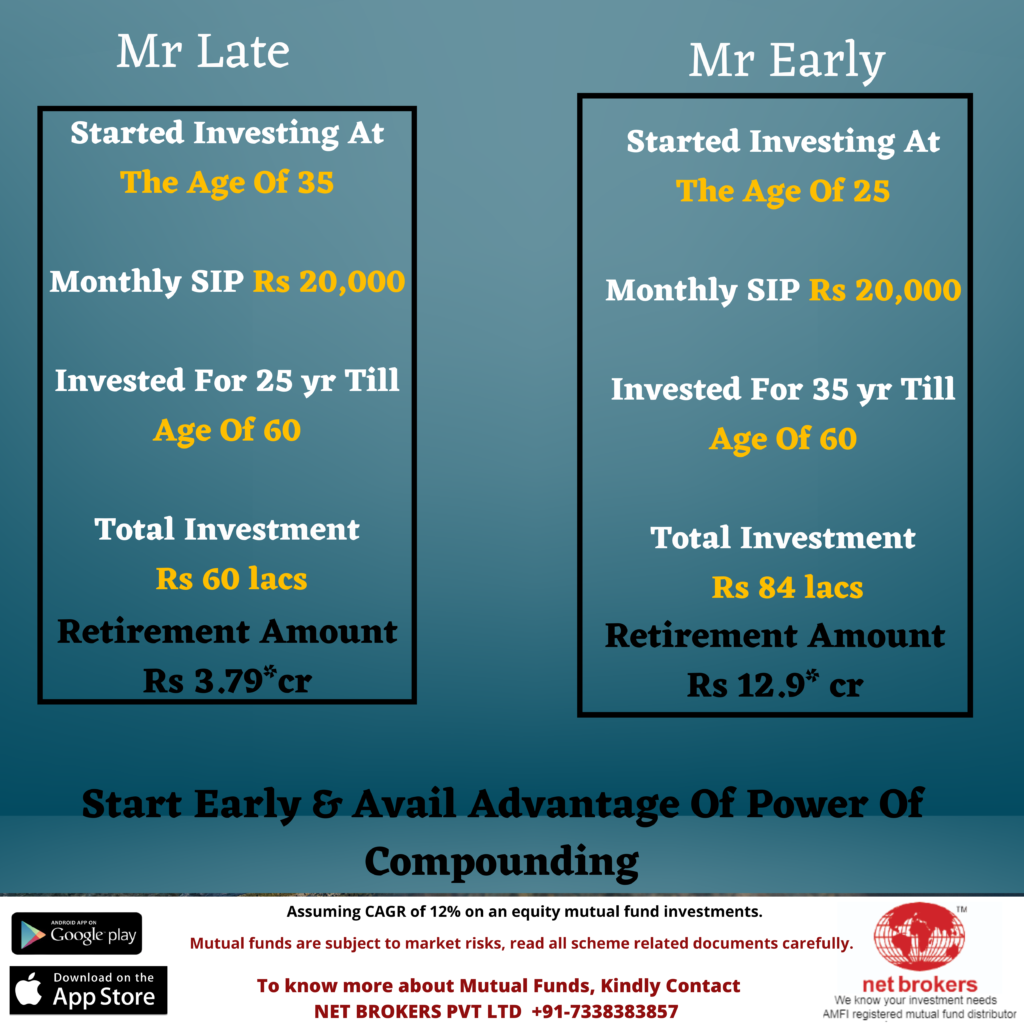Steps to Plan Your Retirement with Mutual Funds
By Akhil Chugh
Date December 15, 2024
Owning a luxury car, buying a dream home, exploring the world, and securing your child’s future are all admirable financial aspirations. Yet, among these goals, retirement holds a unique distinction—it is not a choice but an inevitable phase of life. While other objectives may have alternative paths or timelines, retirement is a certainty that demands proactive preparation. This makes retirement planning a critical component of any financial strategy.
Unfortunately, many young professionals tend to postpone retirement planning, viewing it as a distant concern. However, as retirement approaches, the stark reality often sets in—insufficient savings can jeopardize the ability to enjoy a financially independent and comfortable lifestyle.
Given that most individuals work until the age of 60, and with an average life expectancy of 80 years, it’s clear that income must stretch to cover at least 20-25 years post-retirement. To navigate this phase without financial strain, building a substantial retirement fund is essential.
The key to achieving this lies in starting early. Even small contributions made consistently over time can grow into significant wealth, thanks to the power of compounding. By leveraging this financial phenomenon, your investments can multiply exponentially, paving the way for a secure and rewarding retirement. Begin your retirement planning today with mutual funds, and embrace the golden years with confidence and freedom.

Key Steps to Plan Your Retirement with Mutual Funds:
Initiating retirement planning early is crucial. Let’s understand essential actionable steps for creating a strong foundation, emphasizing the power of compounding and illustrating how even modest contributions can grow into a substantial retirement corpus over time.
1. Start Early:
Retirement planning should ideally start from the day you start earning to reap the maximum benefit of compounding.
We usually delay retirement planning, because we follow an order of goals. For example, buying a car at 25 years of age is more important, owning a house at 35 years of age is more important than retirement planning & so on.
However, the best choice for any early retirement plan is to begin investing in your early 20s. By doing this, you can accumulate a higher amount of corpus with a small amount of monthly investments. Starting retirement planning early gives you an edge as with a longer investment horizon, the compound interest in your investments increases exponentially. This is the power of compounding.
To help put things into perspective, here is a little representation of the impact of delaying investing.

As evident from the above illustration, a delay of only 10 years can reduce your retirement kitty by Rs 9 crores assuming 12% CAGR in equity mutual funds. That is the cost of delaying and the magic of compounding!
Thus, starting early is crucial in retirement planning.
2. Rent vs Buy a Home:
Securing a home for your retirement is a vital consideration, offering both stability and financial advantages. Homeownership not only shields you from escalating monthly rental costs, influenced by the gradual rise in inflation, but it also positions real estate as a valuable long-term asset poised for appreciation over time.
3. Health Insurance:
The past pandemic experience has shown us how a disease can make things uncertain and affect our expenses. With the ever-rising cases of diseases and a sharp rise in healthcare costs, any medical emergency could be crippling to your finances if not planned well. It can make a big hole in your retirement kitty. Thus, health insurance is a necessity. It is ideal to buy medical insurance when you are young as premiums are low and coverage is high.
Get in touch with us at mail@netbrokers.co.in to learn more about available Health Insurance plans.
4. Know your Retirement Age:
The number of years you have to build your wealth and the funds required for your retirement is dependent on your retirement date. Though the majority of people retire at the age of 60, but some want to retire early which means building a higher retirement kitty to finance your retirement life. Thus, understand your retirement date and invest accordingly.

5. Consider Inflation:
The cost of living is continuously increasing with rising inflation. By the time you will reach your retirement age, you will need more money each month to sustain the current standard of living. This rising inflation needs to be taken into account while deciding your target retirement corpus.
6. Investment Portfolio – Know Where to Invest?
What should your retirement portfolio consist of? If you have a long-term investment horizon i.e., more than 10 years to retire, investing in equity funds is a good option as it is an asset class that has the ability to beat inflation and provide high returns over a longer time horizon. If, however, you are closer to retirement, it is advisable to invest in debt or hybrid funds (a combination of debt and equity where debt forms a major component of your portfolio). Debt investments not only provide stability to your portfolio but also generate regular income.
7. Opt for the SIP route:
SIP is a disciplined form of investing allowing you to invest money into a mutual fund scheme periodically, such as daily, weekly, monthly, quarterly, or half-yearly, etc. Every time you invest money, additional units of the mutual fund scheme are brought at the market rate and added to your account. Thus, you keep buying units at different rates – more units when the market is low & fewer units when the market is high – helping investors to benefit from rupee cost averaging as well as the power of compounding. SIP or Systematic Investment Plan offered by mutual funds is an ideal and disciplined way of investing over a long period of time. It is not only an easier and more disciplined mode of investing but also let experts manage your investment.
Furthermore, recognizing the importance of accumulating a substantial retirement corpus, consider the efficacy of SIP top-ups. This additional feature allows you to increase your investment amount periodically, enhancing the potential for a more significant corpus and bolstering your financial foundation for retirement.

8. Never Touch Your Retirement Fund to Finance Other Goals:
Never withdraw funds from your retirement corpus, before you have retired, irrespective of the financial emergency as you cannot avail of any loan from any source to fund your retirement life.
Net Brokers Takeaways:
- A small amount invested for a long time period would fetch better returns than a one-time investment. It’s always better to start early to unlock the power of compounding to accumulate the desired retirement corpus.
- Have different plans for different goals such as retirement, child’s marriage, child’s education, etc. Never use funds that are intended for some specific purpose, when you need money.
- Start your retirement planning as early as possible via monthly SIPs in equity mutual funds. Equity mutual funds give returns that beat inflation over the long term and can help you accumulate a substantial retirement corpus to fulfil your retirement dreams.
- Invest regularly & increase your investments every year with rising income via SIP top-ups.
Post-retirement life requires you to have a stable source of income to be able to continue your existing lifestyle. With the help of the right financial planning, you can easily plan for a secure and comfortable future. Get in touch with us today to learn more about how you can successfully plan your retirement.
Download our mutual fund app & start investing for your long-term financial goals.
Happy retirement planning!



